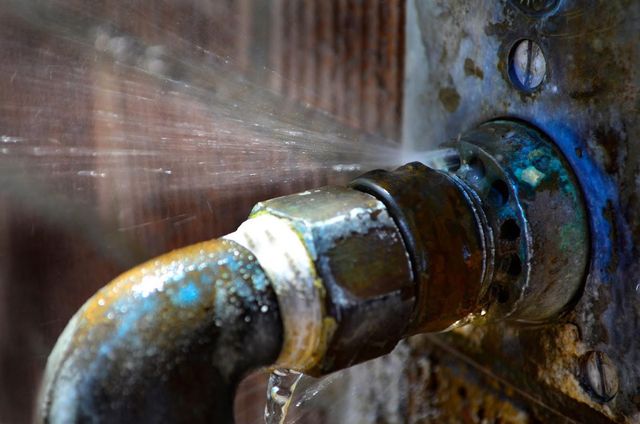6 Ways to Detect Covert Water Line Leaks Effectively
6 Ways to Detect Covert Water Line Leaks Effectively
Blog Article
We've uncovered this article on Leaking water lines down the page on the web and concluded it made good sense to talk about it with you on this site.

The moment you locate a leak, calling your plumber for repair work is the very best service. Nonetheless, some tiny water leaks might not be visible. If you can not spot it with your naked eyes, below are some hacks that help.
Early detection of leaking water lines can alleviate a possible disaster. Besides conserving you money, it will minimize the worry and disappointment.
Examine Water Intake
Assess your water bills and track your water intake. As the one paying it, you should discover if there are any type of inconsistencies. If you identify sudden changes, regardless of your intake coinciding, it means that you have leaks in your plumbing system. Remember, your water bill ought to fall under the same range each month. An unexpected spike in your expense suggests a fast-moving leakage.
On the other hand, a consistent boost each month, despite the same practices, shows you have a slow leakage that's additionally slowly escalating. Call a plumber to thoroughly check your residential or commercial property, especially if you really feel a cozy area on your flooring with piping beneath.
Examine and Assess the Circumstance
Property owners should make it a routine to examine under the sink counters as well as even inside cabinets for any bad odor or mold and mildew development. These 2 warnings indicate a leak so timely interest is needed. Doing regular evaluations, even bi-annually, can conserve you from a significant issue.
Examine the Water Meter
Examining it is a proven way that helps you uncover leaks. If it moves, that shows a fast-moving leak. This implies you might have a slow leak that can even be underground.
Asses Exterior Lines
Don't fail to remember to inspect your outdoor water lines too. Must water permeate out of the link, you have a loosened rubber gasket. One small leak can squander lots of water as well as surge your water expense.
Do a Food Coloring Test
When it comes to water usage, 30% comes from bathrooms. If the shade in some way infiltrates your dish during that time without flushing, there's a leakage in between the container and also dish.
If you recognize your house is already old, maintain a careful eye on your heating units, hoses, pipelines etc. Look for stainings and weakening as the majority of pipelines as well as home appliances have a life span. They will certainly additionally normally degrade because of tear and put on. If you believe dripping water lines in your plumbing system, don't await it to escalate. Call a professional plumber right away so you don't wind up with an awful mess in your house.
The moment you locate a leak, calling your plumber for repair services is the best option. Some little water leaks might not be noticeable. Inspecting it is a proven way that assists you uncover leakages. One tiny leak can throw away loads of water and also spike your water expense.
If you believe leaking water lines in your plumbing system, don't wait for it to intensify.
5 Signs that Your Home Has a Hidden Leak
Your water bill is unusually high without explanation
Generally, your water bill tends to stay consistent throughout the year as long as the same number of people live in your household year round. The bill might be higher during certain times of the year, such as summer, when your lawn may require more watering than it does in cooler months. However, if you notice a rise in your water bill that you can’t explain, it’s an indicator that there’s a hidden leak somewhere in your home.
You hear running water
One of the biggest signs that you have a water leak is the sound of rushing water when no plumbing fixtures are on and when no water-using appliances are running. If you hear running water in your walls when no water is being used anywhere in your home, locate your home’s main water shut-off valve, shut off your water supply, and contact a plumber at once.
Your home smells musty
Hidden leaks often occur in dark spaces, such as behind walls or under carpeting. Incidentally, darkness and moisture can create an ideal breeding environment for mold or mildew. If you start to smell mildew or the scent of rotting wood or stagnant water around your home, it’s a fair bet that a leak is the culprit.
You find wet spots around your home
The wet spots usually show up as moist areas in your carpeting. If your home has a basement level, puddles on the floor could indicate a slab leak. Outside, unexplainable puddles or lush, green patches in your yard often mean that there’s a leak in your sewer line or main water line.
You have stains, bubbles, or condensation on your walls/ceiling
Stains or condensation on your walls or ceiling are both major signs of a hidden leak. Also, drywall (AKA. sheetrock) is very absorbent, and as it takes on more water from a leak behind a wall, it will start to bubble, swell, or warp. If you see this happening in your home, don’t wait to contact a plumber before the water damage spreads.
https://www.ezflowplumbingaz.com/blog/2019/june/5-signs-that-your-home-has-a-hidden-leak/

We are very involved in Hacks to detect leaks and I really hope you appreciated the new article. Appreciated our blog posting? Please share it. Help others find it. Thank-you for your time spent reading it.
Website Report this page